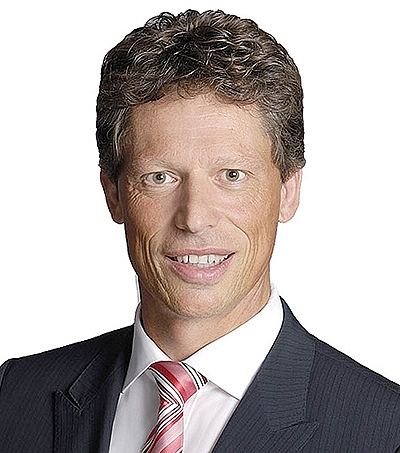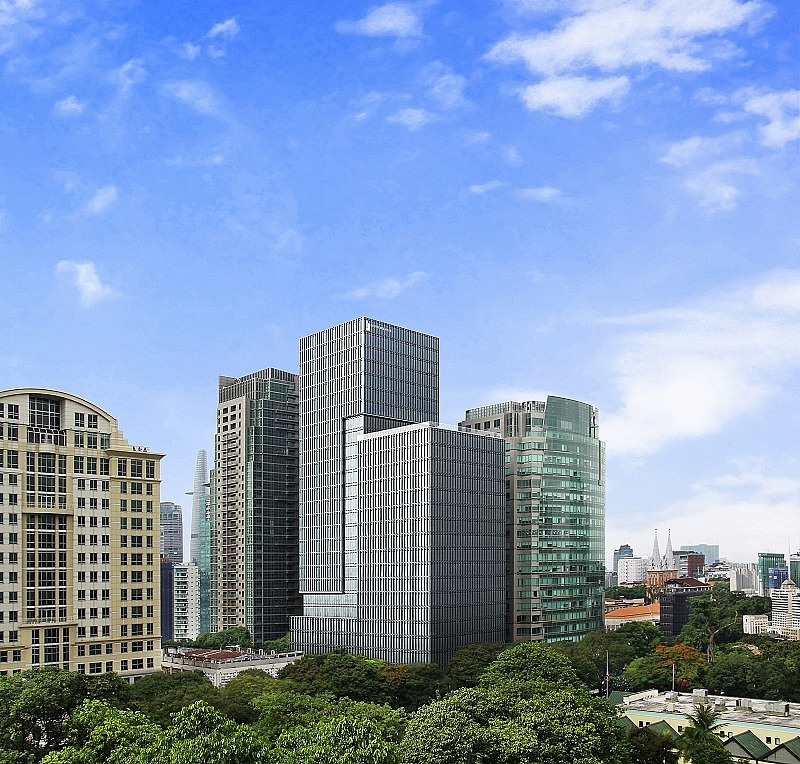Siemens is keen to build for the future
 |
| Matthias Rebellius CEO, Siemens Building Technologies |
In early March, the Comprehensive and Progressive Agreement for Trans-Pacific Partnership was signed by its 11 member countries in Santiago, Chile. The signatories are Canada, Mexico, Japan, Malaysia, Australia, Peru, New Zealand, Chile, Brunei, Singapore, and Vietnam. Collectively, these countries represent 13.5 per cent of the global economy and form a market of 500 million people, greater than that of the European Union. It is a partnership that will dramatically lower tariffs and trade barriers between the signatories and bolster the positive outlook for Vietnam's economy.
According to PR Newswire, the country’s construction industry is expected to expand in real terms over the forecast period (2017-2021), due to investments in transport infrastructure, energy and utilities, and affordable housing projects. Additionally, government investment in public infrastructure and education and healthcare buildings as part of the 2016–2020 Development Plan will support this growth. This positive outlook reinforces the confidence of foreign companies that are doing business in Vietnam, such as Siemens.
A global technology powerhouse that has stood for engineering excellence, innovation, quality, reliability, and internationality for 170 years, Siemens AG is active around the globe, focusing on the areas of electrification, automation, and digitalisation. One of the world’s largest producers of energy-efficient, resource-saving technologies, Siemens has been a part of Vietnam’s economic development since 1993. Over the years, the company has grown in strength and Siemens Building Technologies has been involved in key infrastructure projects, ranging from hospitals to office and residential buildings, hotels and resorts to airports. The latest project being the Deutsches Haus building in Ho Chi Minh City.
According to Matthias Rebellius, CEO of Siemens Building Technologies, for his division, a building is more than just four walls. He believes it represents a place where people learn the most important lessons in life, where they encounter the personalities that inspire them, where the best of a person’s ideas are born. For him, buildings are the places where we spend time with the people we love. Siemens Building Technologies is passionate about helping its customers create their “perfect place”.
“The Building Technologies Division of Siemens offers energy efficient, safe, and secure buildings and infrastructure. In Vietnam, we serve the building technologies market together with our value-added partners. To date, we have about eight partners who provide our comprehensive portfolio of building automation systems, room controls, field devices, and fire safety systems. Creating perfect places and improving building technology to improve people’s lives is our motivation. And we carried this passion with us to the Deutsches Haus in Ho Chi Minh City,” he said.
The building houses a modern integrated building management system (IBMS) based on Siemens’ Desigo CC platform. This IBMS is the most extensive building management system currently available on the world market. With Desigo CC, Deutsches Haus is able to centrally control, manage, and optimise its heating, ventilation, and air conditioning (HVAC), energy management, power, video, safety, and security systems. The modular nature of this IBMS means that it can be tailored to meet a building’s current needs, yet is expandable to ensure that future needs are also met. The transparency provided by Desigo CC also helps Deutsches Haus meet its goal of becoming the most energy-efficient premium green office building in Vietnam.
 |
| The Deutsches Haus Ho Chi Minh City was constructed with the most modern German construction technologies and machinery and is currently one of the most energy-efficient green premium office buildings in Vietnam |
As part of its efforts to create a perfect place, Siemens Building Technologies is poised to support the digital transformation of its customers’ buildings. “Over the years, we have seen changes in our customer’s requirements and expectations. Today, our customers expect more transparency, quicker and more predictive services, and additional value to be generated from their building data,” Rebellius said.
“Our customers also expect developments in technology to result in new opportunities and generate more value along their value chain. A key enabler for the creation of such value is building data. This data has the potential to generate concrete actions which positively influence the building’s performance in terms of energy efficiency, safety and security, user satisfaction, and space occupancy.”
Taking advantage of the building data requires analytical expertise coupled with domain know-how and engineering finesse – and that is where Siemens Building Technologies’ competitive edge lies. By harnessing the power of data, they are able to help their customers manage building data and make well-informed decisions which will help them fulfill their business goals. Therefore, the building becomes a positive contributor to a company’s key performance indicators.
A perfect example of how Siemens has successfully enhanced a building’s performance using the power of data is the Sello shopping centre in Finland. Sello is Finland’s second-largest shopping centre, and with 24 million visitors per year, it is Finland’s most visited one. The first shopping centre in Europe to become LEED EB gold-certified in 2010, it aims to remain the greenest shopping centre in Europe, providing its 170-plus tenants with a sustainable business environment. Siemens gathered and evaluated data from 1,500 energy and HVAC data points using Navigator – Siemens’ cloud-based energy and sustainability platform. In addition to that, using smart data visualisation and automated reporting, the building performance development tool ensures that the data collected can be used as efficiently as possible. Desigo provides information and communication technology analytics, ensuring that everything happening inside the shopping centre is recorded and analysed. Things happening outside the shopping centre, such as changes in weather, are also assessed.
By leveraging data from these various points, Siemens identified areas for improvement and delivered a comprehensive optimisation programme for Sello’s building systems, focusing on energy consumption and air quality. This resulted in energy savings of €110,000 ($135,000) per year, a 20 per cent reduction in CO2, and a 50 per cent reduction in district heating. The impacts of these data-driven changes on Sello’s business goals were increased tenant satisfaction and retention, improved public perception and visitor satisfaction, and reduced operating expenses.
The growing adoption of smart building technology is driving changes in the overall real estate market. Experts anticipate that building valuation models will soon evolve to incorporate the building’s ‘intelligence,’ especially as smart building technology drives improvements in efficiency and utilisation and creates leverage for investors in new and unique ways.
Another area that would reap the benefits of digitalisation is the premium office space. We spend a substantial part of our lives in office buildings, so the office environment and space have now become an important part of the business delivery process. For Siemens, the perfect workplace of the future will provide maximum comfort, safety, and security, achieved through intelligent monitoring and rule-based adjustment of temperature, light, and ventilation. User-centric applications will provide building users with control of their environment and provide them with information about events most relevant to them, such as fire drills or emergency evacuation plans. Location-based services will make it easy for colleagues to find each other in a flexible office set up. A seamless security system will offer mobile-based access for both employees and visitors. Most importantly, a perfect workplace is also an efficient building that performs optimally, thanks to the advanced data analytics.
Building users want to interact with the buildings in new ways and landlords want to use tenant experience as a differentiator. Forward-thinking building owners, tenants, and managers are already realising the competitive advantages gained from smart building technologies.
As a country located within a high growth region, the adoption of the Internet of Things in Vietnam is picking up pace tremendously. According to Rebellius, Siemens Building Technologies is committed to being there every step of the way. “With a combination of our people, technology, and services, our reference sites are proof that we are able to help our customers achieve their business goals by enhancing the performance of their buildings,” he said.
What the stars mean:
★ Poor ★ ★ Promising ★★★ Good ★★★★ Very good ★★★★★ Exceptional
Themes: CPTPP
Related Contents
Latest News
More News
- Vietnamese businesses diversify amid global trade shifts (February 03, 2026 | 17:18)
- Consumer finance sector posts sharp profit growth (February 03, 2026 | 13:05)
- Vietnam and US to launch sixth trade negotiation round (January 30, 2026 | 15:19)
- NAB Innovation Centre underscores Vietnam’s appeal for tech investment (January 30, 2026 | 11:16)
- Vietnam moves towards market-based fuel management with E10 rollout (January 30, 2026 | 11:10)
- Vietnam startup funding enters a period of capital reset (January 30, 2026 | 11:06)
- Vietnam strengthens public debt management with World Bank and IMF (January 30, 2026 | 11:00)
- PM inspects APEC 2027 project progress in An Giang province (January 29, 2026 | 09:00)
- Vietnam among the world’s top 15 trading nations (January 28, 2026 | 17:12)
- Vietnam accelerates preparations for arbitration centre linked to new financial hub (January 28, 2026 | 17:09)

 Tag:
Tag:



















 Mobile Version
Mobile Version